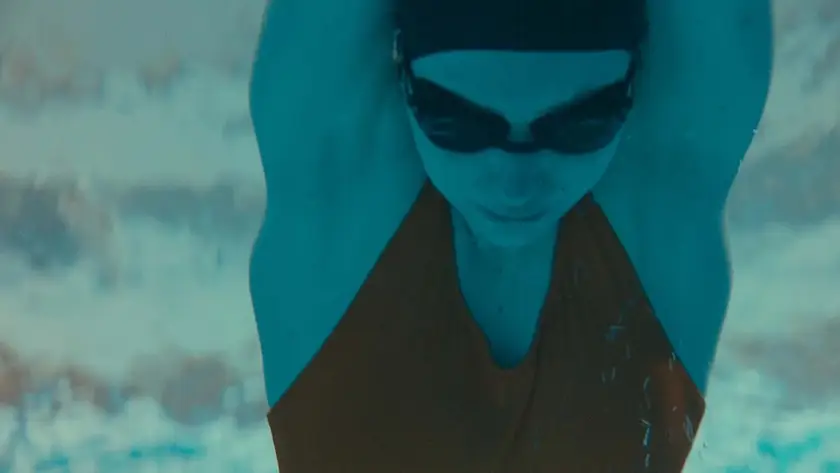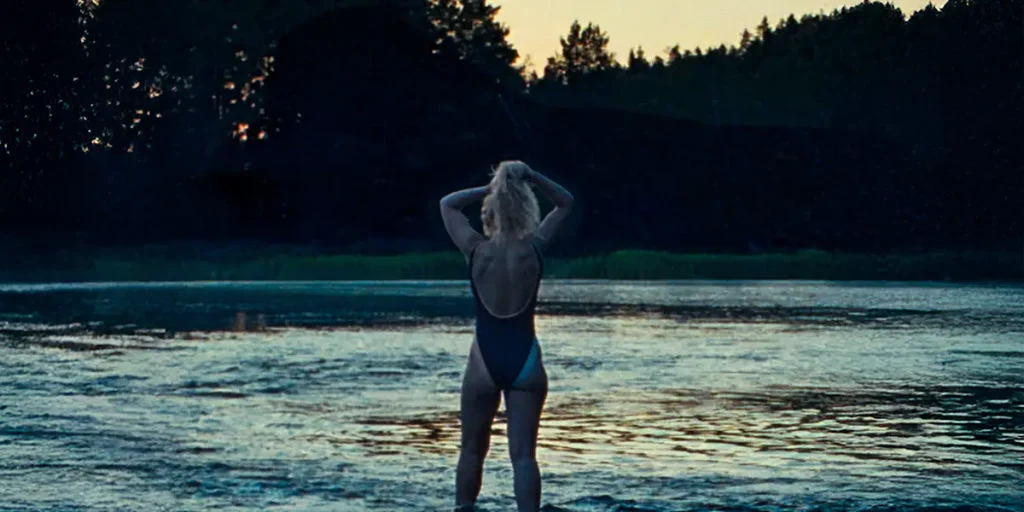Kristen Stewart’s The Chronology of Water is a feat in experimental filmmaking that refuses to dilute itself for its audience’s viewing comfort.
Director: Kristen Stewart
Genre: Drama, Biographical, Romance
Run Time: 128′
Cannes Premiere: May 16, 2025
U.S. Release: December 5, 2025 (limited); January 9, 2026 (wide)
U.K. & Ireland Release: February 6, 2026, with previews from January 24
Where to Watch: In U.S. theaters and in U.K. & Irish cinemas
For decades, Kristen Stewart has defied the film industry’s expectations of her. She has turned in performances that repeatedly improved upon the last, made it her mission to join projects that center underrepresented narratives and put artistic integrity at the center of her career. She is one of the most versatile film stars of the modern age. And now, in her seventh Cannes appearance, she is reintroducing herself in an entirely new creative capacity with a dauntless directorial debut. Her feature film The Chronology of Water, adapted from Lidia Yuknavitch’s memoir of the same name, has been eight years in the making.
After facing numerous setbacks, the film finally made its way to the Croisette to reveal an entirely new layer to Stewart’s artistic genius.
The Chronology of Water is a kaleidoscopic view into the many lives our protagonist Lidia (Imogen Poots, of All of You) has lived. When piecing together her story, we see Lidia has grown up in a household with an absentee alcoholic mother and a sexually abusive and controlling father. Her older sister, Claudia (Thora Birch, of Hocus Pocus 2), fled the house because she couldn’t tolerate the abuse any longer, leaving Lidia to fend for herself.
The one true reprieve Lidia had from her homelife is in competitive swimming. After earning a swimming scholarship to a college in Texas, Lidia is able to escape her abusive father and troubled mother to embark on her own journey. Having autonomy over her body for the first time in her life, Lidia descends into a world of sex, booze and drugs, taking everything on in excess.

While her problems with addiction cause her to lose her swimming scholarship, she eventually straightens herself up and moves to the University of Oregon to pursue an education in writing. At Oregon, she is accepted as one of thirteen graduate students to collaborate on famed American author Ken Kesey’s (Jim Belushi, of Little Shop of Horrors) novel “Caverns” and study under him. Kesey’s course and mentorship helps Lidia find her voice as a young writer.
As Lidia starts a career in writing and academia, she finds ways to cope with her past through storytelling. While still engaging in self-destructive behavior, she begins to find her footing and solid ground after a life of treading water.
Stewart sets the tone of the film with the opening line: “I thought about telling this story from the beginning, but that’s not how I remember it”. The Chronology of Water doesn’t give you time as an audience member to get your bearings. We meet Lidia mid-memory before being dragged into another place and time in her life. We are not with her long enough to make sense of the images flashing before us. Blood, water, a house, tears and strangers stream through in interrupting images. The way the film is shot mimics the feeling of trying to settle your mind when you know you have to go to sleep or trying in vain to calm yourself down when your mind starts spiraling.
Stewart doesn’t allow us to get comfortable because this story wasn’t made to comfort us. In The Chronology of Water, Stewart doesn’t dull down the raw, vulnerable and unsettling imagery that Lidia Yuknavitch’s memoir depicts. She takes the pain of Lidia’s inner world and splatters it on the screen before us. She dares the audience to look, see and feel exactly what Lidia’s memory recounts when she looks back on her life.
The Chronology of Water is an objectively difficult watch. Lidia is a woman who has endured some of the most difficult and painful experiences any woman, truly any human being, can go through and has been forced time and time again to rebuild herself from the ground up. But even in the film’s darkest viewing moments, there’s a degree of respect to be given to Stewart for her unwavering dedication in the way she tells Lidia’s story.
There’s never a sense that Lidia’s trauma is being exploited, which is strange given how much the story bears the deep personal traumas of Yuknavitch’s life. Rather, The Chronology of Water is an ode to rebuilding yourself no matter how hard life knocks you down.
Lidia’s connection to the water and the many ways in which her love for swimming is shown throughout her life was the only avenue through which her life story could be told. This is a woman who has lived many lives, the only constant being a rebirth through water, cleansing her of past darkness in pursuit of finding a peaceful future.
Kristen Stewart’s directorial debut is a living, breathing piece of art. It’s a masterful translation of an impossibly difficult life that, while deeply dark, never gives up on the possibility of finding the light.
The Chronology of Water: Movie Plot & Recap
Synopsis:
After fleeing an abusive household by means of a college swimming scholarship, Lidia descends into a world of addiction and loses everything. When she begins to find a voice through writing, Lidia is able to address her troubled past and look towards a future that finally looks hopeful.
Pros:
- Stewart proves she is in a league entirely of her own with her artistic and experimental directorial debut.
- Imogen Poots is the emotional core of this film and she bears the weight of it beautifully.
Cons:
- The plot’s themes are heavy in a way that are particularly hard to stomach, which makes the story work better in retrospect rather than in reality.
The Chronology of Water premiered at the Cannes Film Festival on May 16-18, 2025. The film will be released in U.S. theaters on January 9, 2026 and in U.K. and Irish cinemas on February 6, 2026, with previews from January 24.

